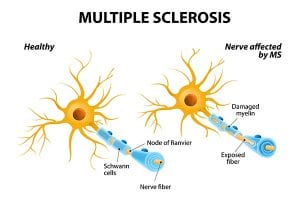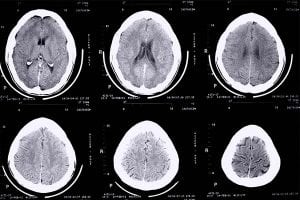 The cause of multiple sclerosis is unknown, but it is believed to be an autoimmune disease where the body attacks its own tissues. The immune system attacks myelin, a protective sheath covering the nerves. The nerves may deteriorate over time, and this disrupts communication between the brain and the rest of the body.
The cause of multiple sclerosis is unknown, but it is believed to be an autoimmune disease where the body attacks its own tissues. The immune system attacks myelin, a protective sheath covering the nerves. The nerves may deteriorate over time, and this disrupts communication between the brain and the rest of the body.
Symptoms: The symptoms of multiple sclerosis vary widely depending on the amount of damage. It is common for patients with multiple sclerosis to have new symptoms develop and then improve for a period of time, a process known as relapse and remission. Some of the most common symptoms of multiple sclerosis include vision problems, tingling, muscle stiffness, and trouble walking. Numbness and weakness may occur on one side of the body at a time. As the condition progresses, tremors, fatigue, dizziness, slurred speech, and bladder and bowel problems may develop. Patients with multiple sclerosis may also experience mental changes and depression.
The symptoms of multiple sclerosis vary widely depending on the amount of damage. It is common for patients with multiple sclerosis to have new symptoms develop and then improve for a period of time, a process known as relapse and remission. Some of the most common symptoms of multiple sclerosis include vision problems, tingling, muscle stiffness, and trouble walking. Numbness and weakness may occur on one side of the body at a time. As the condition progresses, tremors, fatigue, dizziness, slurred speech, and bladder and bowel problems may develop. Patients with multiple sclerosis may also experience mental changes and depression.
Treatments: There is no cure for multiple sclerosis, but the symptoms can be managed. Attacks can be treated with corticosteroids and plasma exchange. The progression of the disease can also be modified with medications that can block immune system attacks and reduce relapses and fatigue. Physical therapy and muscle relaxants may also be used.




